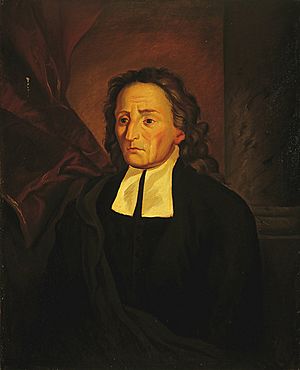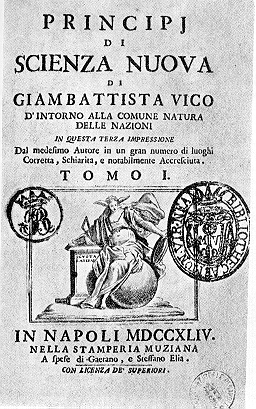Giambattista Vico facts for kids
Quick facts for kids
Giambattista Vico
|
|
|---|---|
 |
|
| Born |
Giovan Battista Vico
23 June 1668 Naples, Kingdom of Naples
|
| Died | 23 January 1744 (aged 75) Naples, Kingdom of Naples
|
| Education | University of Naples (LL.D., 1694) |
|
Notable work
|
|
| Era | 18th-century philosophy |
| Region |
|
| School |
|
| Institutions | University of Naples |
|
Main interests
|
Epistemology, humanities, jurisprudence, philosophy of history, philosophy of science, poetry, political philosophy, rhetoric |
|
Notable ideas
|
|
|
Influences
|
|
Giambattista Vico (born Giovan Battista Vico, 23 June 1668 – 23 January 1744) was an Italian philosopher, speaker, historian, and lawyer. He lived during the Italian Enlightenment. Vico questioned the popular ideas of his time, especially rationalism, which focused only on logic. He believed that older ways of thinking, like those from classical antiquity and the Renaissance, were very important.
Vico is also known for being one of the first thinkers in the Counter-Enlightenment. This was a movement that reacted against some of the main ideas of the Enlightenment. He also helped create the basics of social science and semiotics, which is the study of signs and symbols.
One of Vico's most famous ideas is Verum esse ipsum factum, which means "truth is itself something made". This idea suggests that we truly understand something when we have created it ourselves. He also started the modern study of the philosophy of history, which looks at the meaning and purpose of history.
Vico's most important book is Scienza Nuova, or New Science (published in 1725). In this book, he tried to organize the humanities (subjects like history, literature, and art) into a single science. He wanted to explain how societies grow and fall in historical cycles.
Contents
Giambattista Vico: His Life and Ideas
Early Life and Education
Giovan Battista Vico was born in Naples, Italy. His father was a bookseller. Vico went to several schools, but he often felt sick and didn't like the traditional teaching methods of the Jesuits. Because of this, he was mostly taught at home by tutors.
When he was seven, Vico had an accident where he fell. This made him stay home from school for three years. During this time, he likely taught himself a lot, with his father's help. He later attended the University of Naples. In 1694, he earned a degree in Civil and Canon Law.
Career and Family Life
In 1686, after recovering from typhus, Vico took a job as a tutor in Vatolla, south of Salerno. He worked there for nine years, until 1695. In 1699, he married Teresa Caterina Destito, a friend from his childhood.
That same year, Vico became a professor of rhetoric at the University of Naples. He held this position until 1741, when he retired due to poor health. Vico always hoped to become a professor of jurisprudence (the study of law), which was a more respected role, but he never achieved it. However, in 1734, he was named the official historian for Charles III, the King of Naples. This job paid him more than his university salary.
Vico's Views on Rhetoric and Humanism
What is Rhetoric?
Vico's ideas about rhetoric (the art of speaking or writing effectively) were connected to his interest in humanism and education. In a speech he gave in 1708, called On the Order of the Scholarly Disciplines of Our Times, Vico said that anyone who wanted to work in public life, like in courts or government, should learn to be good at arguing and speaking clearly. They should be able to discuss different sides of a topic and use arguments that are most likely to be true.
However, in his book Scienza Nuova, Vico later said that just arguing both sides of a topic could be "false eloquence." He believed that true rhetoric should be connected to "common sense" (sensus communis). This means the shared understanding that all people have.
The Importance of Common Sense
As a professor, Vico taught students how to prepare for careers in law. He focused on the formal parts of rhetoric, like how to arrange and deliver an argument. But he also stressed that rhetoric should be linked to logic and dialectic (the art of discussing ideas).
Vico thought that modern rhetoric had lost its connection to common sense. He believed that good speaking should start from a main idea and then explain it by looking at how things appear in our daily lives. He valued discovery and finding arguments based on experience, rather than just using abstract rules.
Following the ideas of Socrates and Cicero, Vico believed that a true speaker helps students discover the truth. He emphasized the importance of civic life and professional duties, which was a key part of the humanist tradition. Vico argued against the "geometrical method" of thinkers like René Descartes, which relied too much on strict, logical rules.
The Verum Factum Principle
Vico is most famous for his verum factum principle. He first wrote about this idea in 1710 in his book Of the Most Ancient Wisdom of the Italians. This principle states that we truly know something when we have made or created it ourselves. It's not just about observing something, as Descartes believed.
Vico explained: "The way to know what is true is to have made it." He argued that our clear idea of our own mind doesn't mean we made our mind. This idea was very important for his later work, Scienza Nuova (The New Science). He believed that human society and its history, like mathematics, are things that people have built and created.
The New Science
The New Science (published in 1725) is Vico's most important book. It has greatly influenced the philosophy of history, which studies how history develops and what it means. Thinkers like Isaiah Berlin and Hayden White, who study how ideas change over time, found Vico's work very important.
In this book, Vico tried to create a new way of understanding human history. He believed that societies go through cycles of growth, decline, and rebirth. He looked at how language, myths, laws, and customs develop over time.
Vico's Lasting Impact
Vico's ideas, though not widely known in his own time, became very important later on. He was like a "sleeping partner" of the Age of Enlightenment, meaning his ideas were ahead of his time.
Influence on Later Thinkers
In the 19th century, French historians who were part of the Romantic movement used Vico's works as models for how to study history.
Karl Marx, a famous thinker who wrote Capital, also had ideas similar to Vico's. Both Marx and Vico saw social-class struggles as a way for people to achieve equal rights. Vico called this period the "Age of Men." However, Vico believed that too much equality could lead to chaos and the collapse of society. He thought that religion and a belief in divine providence (God's guidance) were needed to keep order in human society.
Edward Said, a well-known literary critic, also credited Vico with influencing his work. Said admired Vico's idea that "men make their own history." He extended this idea to geography, suggesting that places like the "Orient" and "Occident" are also created by human ideas and cultures.
Vico's Legacy
Vico's work continues to be studied today. His ideas about how societies develop, the importance of human creation, and the role of history have left a lasting mark on many fields. He showed that understanding the past is key to understanding ourselves and our world.
Works by Giambattista Vico
- On the Most Ancient Wisdom of the Italians: Unearthed from the Origins of the Latin Language (1710)
- On the Study Methods of Our Time (1708)
- Universal Right (1720–1722)
- The New Science of Giambattista Vico (1725, revised 1730, 1744)
See also
 In Spanish: Giambattista Vico para niños
In Spanish: Giambattista Vico para niños
- New Vico Studies (a journal about Vico's work)
- Recapitulation theory
- Finnegans Wake (a book influenced by Vico's ideas)
Images for kids
 | William Lucy |
 | Charles Hayes |
 | Cleveland Robinson |



